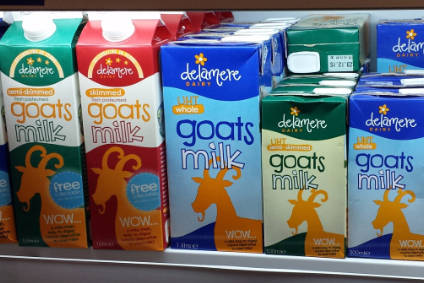
just-food M&A columnist Stefan Kirk looks at the possible M&A candidates in more niche dairy categories in the UK – and suggests three potential targets.
In the last four months two M&A deals have occurred, one in the UK and one in the US, in what many would see as a sleepy corner of the dairy market – cottage cheese. However, we believe the transactions are evidence of a trajectory towards more niche dairy deals in the future – and we identify additional acquisition candidates in this area in the UK.

Discover B2B Marketing That Performs
Combine business intelligence and editorial excellence to reach engaged professionals across 36 leading media platforms.
Glenfield Dairy and Good Culture deals tell a tale
In November, UK dairy co-operative First Milk announced it had sold its Glenfield Dairy to Scottish firm Graham’s The Family Dairy. For Graham’s, the acquisition represented the expansion of its portfolio into cottage cheese and quark, as well as offering the potential of new product development.
Graham’s is a third-generation family dairy business. A company with its profile is not an obvious participant in the M&A market. However, Graham’s appears to believe its Scottish identity has enough of a future in the consumer market that it is prepared to expand in white products by acquiring a fellow business in its domestic market.
Arguably more surprising is the investment announced earlier this month by General Mills in US cottage cheese maker Good Culture. The deal was made through General Mills’ 301 Inc. start-up fund. So, a start-up in a traditional, white dairy product segment, would you believe.
The quest for growth
The Graham’s deal illustrates the viability of independent, niche dairy businesses, while the General Mills deal, moreover, demonstrates the extent to which dairy majors are hungry for new growth segments. Those are two reasons why one can expect more M&A deals involving niche dairy firms in future. Something similar to craft beer, perhaps.

US Tariffs are shifting - will you react or anticipate?
Don’t let policy changes catch you off guard. Stay proactive with real-time data and expert analysis.
By GlobalDataRecently General Mills has announced problems with its Greek yoghurt business in the US. Around a decade ago, Greek and Greek-style yoghurt was the new growth engine in dairy but has now become intensely competitive. The Yoplait owner, like other dairy majors no doubt, is now in search of the next Greek yoghurt to fuel new growth.
One potential avenue to that growth is organic yoghurt, with General Mills also recently announcing it’s stretching its recently-acquired Annie’s brand into the yoghurt category. Another avenue is clearly cottage cheese, through Good Culture. Although that’s a traditional product category, its comeback prospects are enhanced by increasing consumer interest in high protein snacks, according to 301 Inc’s management.
What might be next?
In our M&A practice, we once did some research into potential ‘jewels’ in the UK dairy industry. We weren’t disappointed; although the dairy market is, predictably, dominated by majors such as Muller and Arla Foods, there are a raft of interesting niche players out there; niche in the sense of product, ethnicity or sustainability.
We draw attention to three such players, that could be interesting acquisition targets for dairy majors hungry for growth segments – be that actual or only potential today. We stress however that it is questionable how actionable these candidates are, from an M&A perspective; especially those that have been family-owned for more than two generations.
Our tips are: Castle Dairies, a Welsh producer of salted butter; AE Rodda, a clotted cream maker in the south-western English county of Cornwall, with protected designation of origin status; and Delamere Dairy, a supplier of goat’s milk products. All three are founder- or family-owned, and have a branded focus, which is, of course, essential.
| Delamere Dairy Valuation | ||
|---|---|---|
| Size (€ mln) | 6,5 | |
| Sector | dairy products | |
| Asset Quality | UK niche branded | |
| Seller | family founders | |
| Buyer | large corporate | |
| P/S | 0,2 | |
| P/Ebitda | 16,0 | |
| Type | enterprise value estimate, majority stake | |
Why Delamere Dairy looks the most actionable
 |
On a generational ‘rule-of-thumb’ basis, the least actionable of these companies, from an M&A perspective, is AE Rodda, because it’s been family-run for several generations. Such companies are a notoriously tough nut to crack for M&A practitioners. Castle Dairies, on the other hand, appears to only recently to have had its reins passed over to the second generation, so is potentially more open to strategic investors.
However, another problem is that both of the above, although possessing clear regional and product niche identities, might not have the health or other ‘new frontier’ features that would allow them to form the basis of a new product development strategy, for a dairy major. It’s hard to see how salted butter or clotted cream could appeal hugely to millennials.
In our view, Delamere Dairy is more promising. Still in first-generation ownership (husband and wife founders, since 1985), its goat’s milk-products sales revenue is growing strongly (see profile). However its profitability is very low, and its debt ratio significant, which suggests it could benefit from the marketing and trade terms clout that would come from having a dairy major on board.
The question of course for a potential investor in Delamere Dairy is – coming back to our parallels with yoghurt ten years ago – are goats the next Greeks?
—
Until 31 March, you can get 15 months of access to just-food.com for the price of 12 – and, along with giving you three months for free, you will also receive two exclusive research reports. Full details can be found here.





